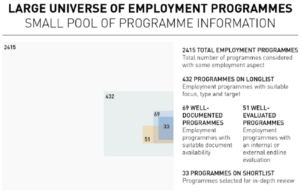The notion that employment can contribute to peace and stability is the explicit backdrop to a large number of the labour, training and entrepreneurship programmes run by international organisations, and an implicit one in many more. The rationale behind this link is firmly grounded in strong and deeply considered economic theories but at the same time, there remains a lack of systematic knowledge on many of the key relationships that, causally, link the two. This begins with a lack of information on two key concepts that underpin the assumption that employment can build to peace. First of all, at the individual-level, important knowledge gaps remain on why individuals select into violent or antisocial behaviour at all, let alone about how these decisions can be deterred. Second, even in situations where individuals are willing to engage in antisocial behaviour, it is not clear how this willingness is organised into collective action. In turn, the anticipated relationship between jobs and peace and stability remains, almost entirely, theoretical.
Read also: Do Jobs Aid Peace? The Impact of Employment Interventions on Peace, Security and Stability in GREAT Insights Magazine
Publication Details
- Year of Publication: 2016
- Region/s: Global
- Theme/s: Impact Evaluation · Shocks & Livelihoods · Violence & Peacebuilding
- Research Topic/s: Employment · Peacebuilding & Reconstruction · Violence & Conflict
- Method/s: Literature Review






